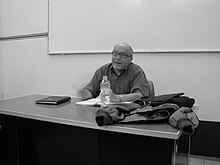Renato Prada Oropeza |
|---|
 |
| Born | Renato Prada Oropeza
(1937-10-17)October 17, 1937
Potosí, Bolivia |
|---|
| Died | September 9, 2011(2011-09-09) (aged 73)
Puebla, Puebla, Mexico |
|---|
| Occupation | Novelist, poet, literary critics, professor |
|---|
| Language | Spanish |
|---|
| Nationality | Mexican |
|---|
| Education | Doctorate in Linguistics |
|---|
| Alma mater | Sapienza University of Rome
Catholic University of Leuven |
|---|
| Period | 1969–2011 |
|---|
| Genre | novel, short story, poetry |
|---|
| Literary movement | Post-Modernism |
|---|
| Notable works | Los fundadores del alba |
|---|
| Spouse | Elda Rojas Aldunate |
|---|
| Children | Ingmar, Fabrizio, Ixchel |
|---|
Renato Prada Oropeza (born October 17, 1937 – September 9, 2011) was a Bolivian and Mexican scientist-literary researcher and writer, author of novels, short stories and poetry books, hermeneutics, semiotics and literary theory. Many of his literary works have been translated into several languages. He was one of the most distinguished semioticians in Mexico and Latin America.[1]
Biography
He was born in Potosí, Bolivia, in 1937. In 1976, due to the dictatorship in Bolivia, he moved to Mexico, where in 1983 he became a citizen. From 1976, Prada was a professor at the Autonomous University in Xalapa, Mexico, and at the Autonomous University of Puebla. He was also an academician of the National Council for Science and Technology of Mexico (an analog of the Academy of Sciences in other countries).
He was married to the Mexican art historian Elda Rojas Aldunate. Their children are Ixchel Vanessa, who is a designer (especially a theatre designer); Ingmar, a researcher and professor of physics; and Fabrizio Prada, who is a Mexican film director.[2]
Oropeza died in Puebla, Mexico, on September 9, 2011; the cause of death was kidney cancer.[3]
Science and literature
Oropeza held the degree of Doctor of Philosophy from the Sapienza University of Rome and a Doctor of Linguistics from the Catholic University of Leuven in Belgium.
He was the head of the scientific school of semiotics in the Autonomous University of Puebla and editor of some Mexican academic journals on literary theory and linguistics and semiotics.[4] He directed doctoral researches, and his disciples work in Mexico, the United States, Italy, Russia, Guatemala, Spain and other countries.[5]
Some novels and short stories by Renato Prada have been translated into English and other languages. In addition to his literary and scientific work, he wrote the screenplays of some Mexican feature films, such as Tiempo Real (2002)[6] and Chiles Xalapeños (2008),[7] and several short films.[8]
His novel Los fundadores del alba, winner of Prize Casa de las Américas in 1969,[9] is considered one of the most significant works of Bolivian literature.[10]
